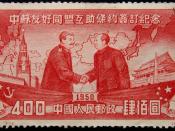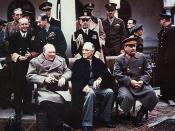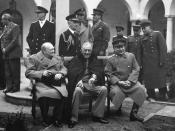With World War II coming to an end, a change in policy and mindset by the world powers was marked by a conference set on the coast of Yalta, Crimea in the Ukraine. Known as the "Big Three", Premier Joseph Stalin, Prime Minister Winston Churchill and President Franklin D. Roosevelt represented the global super powers of Russia, England, and the United States, respectively. The conference was held in February 1945 and was the staging ground for the discussion of many political problems that were arising from the peace settlements. A vast majority of the agreements made at Yalta were kept confidential between the Big Three and their advisers.
One issue was Roosevelt's request for assistance from the Soviet army in dealing with the war in the Pacific. If the Soviet Union would agree to enter the war within 90 days of the end of WWII, they would be granted the Kurile Islands, part of the Sakhalin Island, and access to railroads and port facilities in North Korea, Munchuria, and Outer Mongolia.
Although, the Soviet Union did not declare war on Japan until after the United States officially ended the war, Stalin still received what was promised to him. While it seemed as if Roosevelt's true intentions were geared towards keeping the peace, many would charge that he overly entrusted the Soviet Union.
It was agreed that the eastern border of Poland would be granted to the Soviet Union and Poland would be compensated with German territory on its western border. Along with these provisions Stalin agreed to carry out "free and unfettered elections as soon as possible." Troublesome issues arose with granting parts of Poland to the Soviet Union and in 1945 it was abundantly clear that world intentions of the Soviet Union contrasted greatly with those of America and...


